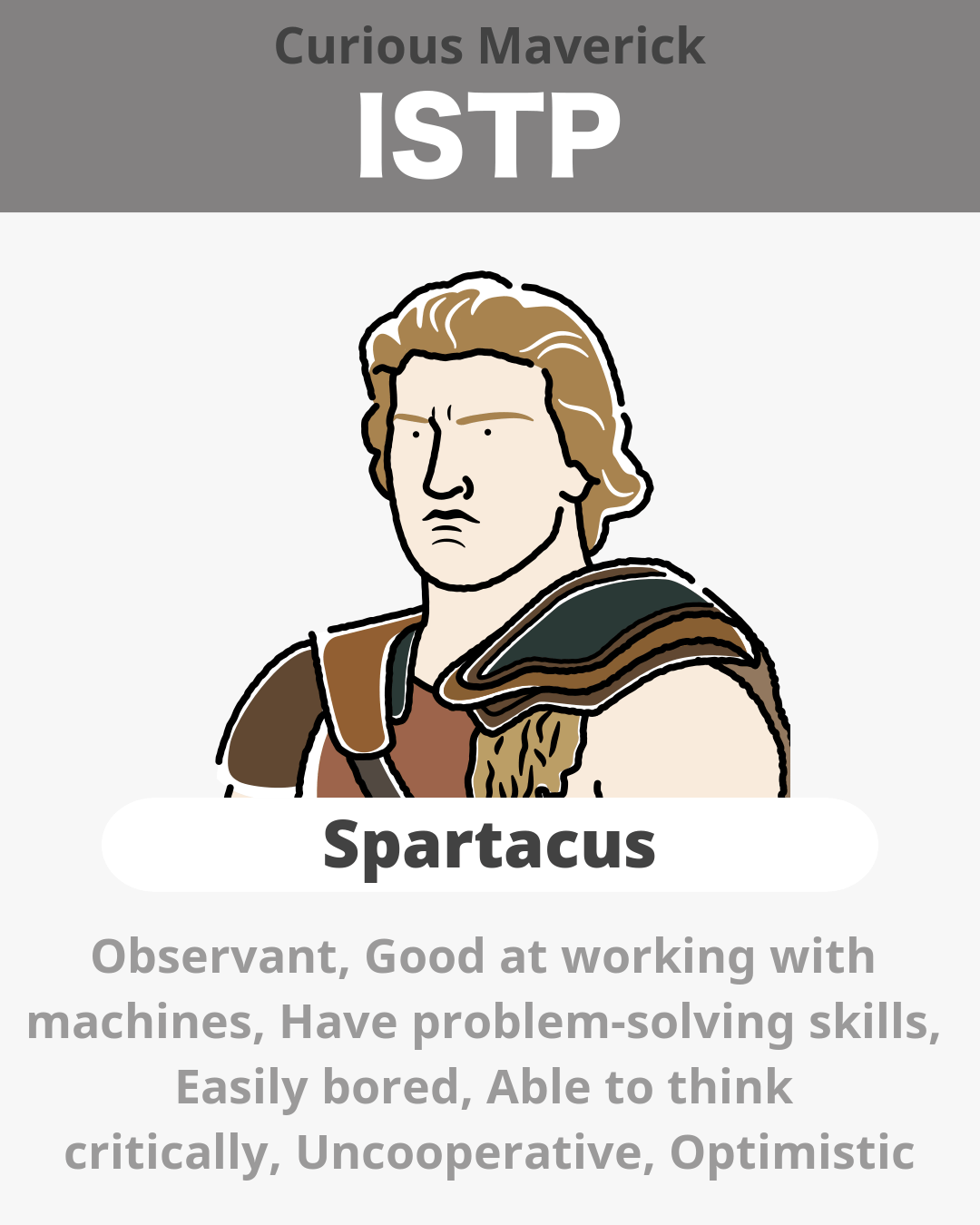
People with the ISTP personality type, also known as the Virtuoso personality type, are highly curious and love to explore new things. They are introverted and value their alone time. They prefer to work on their own rather than communicate and work with others. ISTPs tend to prioritize facts over feelings and are good at analyzing and making things more efficient through keen observation. They are good with their hands, making them well-suited to working with tools and machinery. ISTPs are more flexible than conventional, and they get bored when asked to perform repetitive tasks. They enjoy new challenges with an element of risk, but they have the calmness to think things through and make prudent decisions. They are not good at expressing their feelings and tend to be unsociable.





| Ranks | Types | % | |
|---|---|---|---|
| 1 | INFP | Vincent van Gogh | 13% |
| 2 | ENFP | Anne Frank | 11% |
| 3 | ISFP | Mozart | 8% |
| 4 | INTP | Albert Einstein | 8% |
| 5 | INFJ | Nightingale | 8% |
| 6 | ESFJ | Andrew Carnegie | 7% |
| 7 | ISFJ | Mother Teresa | 7% |
| 8 | ESFP | Marie Antoinette | 6% |
| 9 | ENTP | Thomas Edison | 6% |
| 10 | ENFJ | Joan of Arc | 5% |
| 11 | ISTJ | Sigmund Freud | 4% |
| 12 | ISTP | Spartacus★ | 4% |
| 13 | INTJ | Leonardo da Vinci | 4% |
| 14 | ESTJ | George Washington | 3% |
| 15 | ESTP | Columbus | 3% |
| 16 | ENTJ | Napoleon | 3% |
The ISTP personality type is energetic, practical, and sometimes so direct that it seems insensitive. In addition to being spontaneous and optimistic, a few of their best traits are being realistic, determined, and flexible. Either you like them, or you don't. There is no middle ground.
And ISTPs, one of the 16 personality types, are no different. This article will talk about The Tinkerer's likes and dislikes, as well as his strengths and weaknesses. We'll also discuss how the ISTP type differs for men and women. Before we start, let's ensure you know what kind of person you are.
ISTPs are of the Sensing Thinking (ST) type and tend to analyze everything in their lives. It doesn't matter if they're at work, out with friends, or home with their partner. They like to consider how their relationships help them in the real world.
In a relationship, they like to act in a way that makes them useful to their partner by being logical and practical. Even though they try to avoid conflict, they are firm in their beliefs. So, if they disagree with someone else's point of view, they stick to facts and leave their feelings out of it.
The Craftsman label for ISTPs makes sense. They like making things by hand and doing crafts. They also like to figure out how things work, which means they will probably become engineers, firefighters, or police officers. People think of The Tinkerers as friendly but quiet people who like to go on trips on the spur of the moment and don't mind getting their hands dirty.
How is it that, even though they are always fair, they can't see that sometimes it's more important to get over themselves than to prove their point? So, let's look at the preferences of the ISTP and (hopefully) answer the questions about the mysterious Tinkerer.
Because each person is different and has a nuanced personality, it can be hard to figure out and name all their traits. But personality theory narrowed it down to eight important parts that, when put together, can describe 16 different types. Here are the eight things you like:
A person's Personality Type and Temperament are different ways these preferences come together. ISTPs prefer to be alone, to sense, think, and perceive.
If I've done my job well, you now know more about this type of person who is quiet but also active and spontaneous. But like every other personality type, ISTPs have strengths and weaknesses that affect their actions.
They might not be emotionally available, but if they're in a healthy relationship, they're also spontaneous and like to help their partner. They may not be the greatest at sticking to work schedules, but if they enjoy their profession, they will not stop until the task is completed.
Not only is it important for personal growth and development, but it is also important for mental health. The key to emotional well-being is to look at what you do well and where you could improve. So let's look at what this practical and energetic type does well and what it could do better.
ISTPs are usually good listeners and need to connect with the people around them. They like to figure out how people act and look for things they have in common. Having close relationships with people is very important to them.
They don't like small talk, and they'd rather keep their group of friends small. But the few friends they have can all agree on one thing: you can count on an ISTP to listen to what you've got to say and come up with practical recommendations for whatever you're going through.
The Tinkerers get their energy from within because they are introverts. If they spend too much time with people, they must be alone to regain their energy. This lets them be self-sufficient and independent in all parts of their lives. They like to work alone, and they do their best work when they can make their own rules. They don't need a relationship badly and are great at being on their own.
ISTPs can stay calm and not let their feelings get in the way. So, even when they're in the middle of a fight, they're the best at handling it. One of their best traits is keeping their minds on the task even when things are stressful. This is also clear in how they choose to make a living: they like jobs that push them mentally and physically.
ISTPs like to live in the present and have a positive view of life. They don't spend excessive time thinking about what might have been, so they don't have regrets. This goes along with how well they can deal with stressful situations. They know that it's not the end of the world if something doesn't work out.
ISTPs are great at solving problems because they are naturally good at finding solutions. When it comes to new challenges, they can think things through and work well with their hands and minds. They can try out different ideas until they find the best one and have fun doing it.
People with ISTP tend to be spontaneous and frequently can't stick to a plan or schedule. This could be a problem for them at work since most jobs require some level of planning. ISTPs, on the other hand, don't need a plan. Most of the time, things work out for them because they work hard, and they do less well when they have to follow someone else's routine. The key is letting them do things independently and believing in their skills.
One of the biggest problems with ISTPs is that they are unavailable emotionally. Even though they get by in some parts of life without showing their feelings, it might pose a problem sometimes. If you've had any relationship with just an ISTP, you know how difficult it may be for them to talk about how they feel. Many ENFPs may question whether or not they have any type at all.
Even though ISTPs are great listeners and fun buddies who are always up for a hazard, they also need a lot of time. And while being independent can be good, ISTPs can be too independent. It's hard for them to always assist their friends, and they feel trapped easily. They need their own space, and they would rather break up if they can't get it.
ISTPs spend most of their time at work thinking, and they like to be alone with their thoughts. When making decisions about projects they are working on, they tend to be logical and rational. They also tend to think with all five senses. Here's a complete guide for ISTPs in the workplace:
Resourcefulness: ISTPs often work hard to understand how their projects work on the inside. They can find decisions about logistics and use them practically at work. An ISTP can help you devise a plan to solve a complex organizational problem or conflict that needs to be resolved.
Results-driven: ISTPs are known for getting things done and taking pride in their work. Getting things done makes them happy. They can use their skills to help people learn their technical skills by being a leader. If a company's work environment is good for an ISTP, it may do well in a managerial position.
Crisis management: Often, an ISTP can use their skills to complete projects with set deadlines. They also take pride in fixing the steps needed to finish a task and get to the main goal.
Most of the time, someone with an ISTP personality likes to work alone because they can separate and organize their thoughts to think clearly about their feelings and figure out the next step for their work. A job in a remote area would give them time and space to think clearly so they could finish tasks and figure out how to approach their work.
The talk about ISTP personality types is a great way to see how different introverted and analytical personalities may appear if you look at them more closely. Even though both types may seem emotionally distant, it's important to remember that their traits don't tell the whole story of how they feel. You can start taking the Myers-Briggs personality test to find out your personality type and which functions are most important to you.